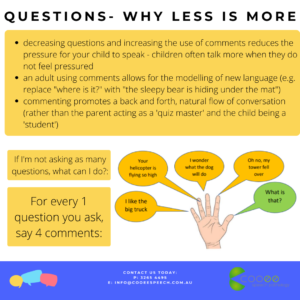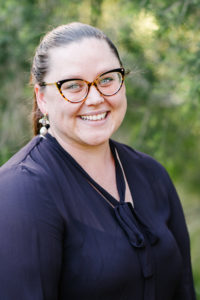Having Fun With Books
You’ll hear a lot of early childhood educators/teachers and other parents talk about the benefits of shared book reading. In this blog post, one of our Speech Pathologists, Libby, talks about some tips and tricks to make book reading fun and enjoyable for everyone!
Shared book reading
 Shared book reading offers many language development opportunities for children. It provides an opportunity for caregivers to connect with children and create a language enriched environment. In these moments, it can be really tempting to ask lots and lots of questions while we look at pictures and talk about what is going on in the book- this is not always the most helpful way to engage children and enjoy book reading time.
Shared book reading offers many language development opportunities for children. It provides an opportunity for caregivers to connect with children and create a language enriched environment. In these moments, it can be really tempting to ask lots and lots of questions while we look at pictures and talk about what is going on in the book- this is not always the most helpful way to engage children and enjoy book reading time.
Tips and tricks with shared book reading
Here are some tips and tricks to engage and have meaningful interactions (and fun!) with books!
-
- Choose a book that you both enjoy
- Even if it’s the same book that might get picked over and over- try new ways to read it or engage with what is in the pages
- Balance your questions and comments
- We generally use the ‘hand’ rule of 5
- Choose a book that you both enjoy
- LOOK at the pictures of the book- follow the child’s point or eyes and talk or label what is happening.
- TALK about what you can see happening in the picture.
- THINK– encourage children to think about the pictures or what might be there (e.g. lift the flaps- oh! There’s something under the bush- I wonder what it is).
- TELL- tell a story or relate to the pictures. Talk about a time where they can relate (e.g. I remember when we saw a sheep at the farm!).
- Then- ASK- ask a question about something that they can see/know/think about the book (e.g. I wonder what it would sound like- can you make a sheep sound?).
 You can also see our great infographic for more information to support you encouraging and engaging with your child throughout shared book reading.
You can also see our great infographic for more information to support you encouraging and engaging with your child throughout shared book reading.
Engaging and using books of interest and changing the way you ‘read’ or interact with favourite books helps to create a wonderful, fun and language rich environment for children! Using the above tips can help develop comprehension, expand their vocabulary, communication and overall social communication skills too.
If you are concerned for your child’s development or would like further information regarding therapy or the intervention process, please don’t hesitate to get in touch with our Northside Speech Pathologists and/or Occupational Therapists via [email protected] or call us at the clinic on (07) 3265 4495.

Libby Hall
Speech Pathologist
